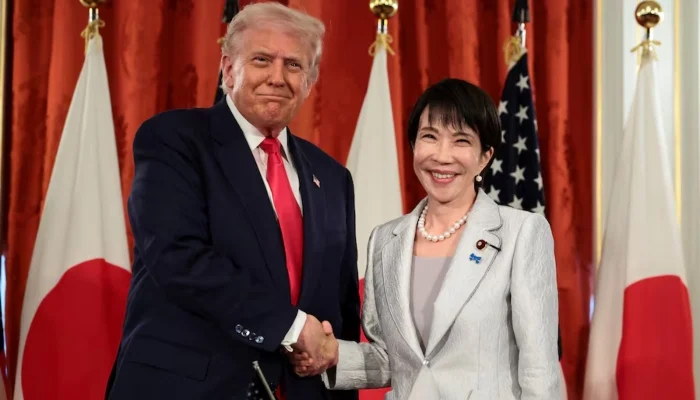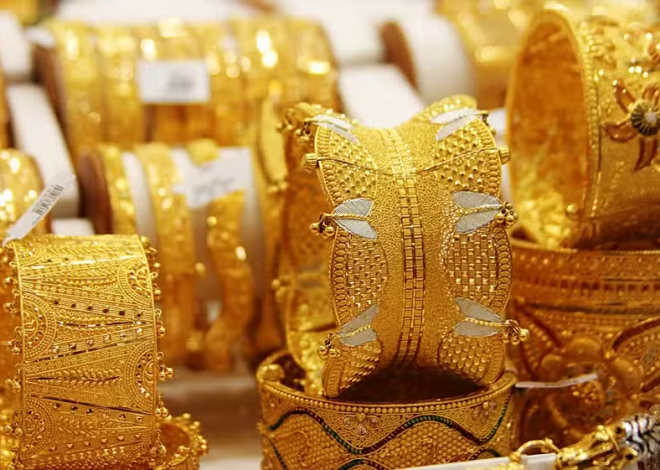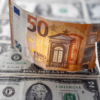
Donald Trump Japan Visit: Donald Trump Praises Japan’s First Female Prime Minister Sanae Takaichi During Tokyo Visit
Strengthening US-Japan Ties
US President Donald Trump on Tuesday heaped praise on Japan’s first female leader, Sanae Takaichi, during his visit to Tokyo, commending her plans to accelerate Japan’s military buildup and signing key agreements on trade and critical minerals.
Takaichi, known for her conservative stance and close association with Trump’s late friend and golfing partner former Prime Minister Shinzo Abe, pledged stronger defense cooperation and deeper economic ties with the United States. In a symbolic gesture, she announced her intention to nominate Trump for the Nobel Peace Prize, a revelation confirmed by White House spokeswoman Karoline Leavitt.
Expanding Economic Cooperation
According to officials familiar with the discussions, Japan is preparing a $550-billion investment package that includes increased purchases of US soybeans, natural gas, and pickup trucks, alongside new shipbuilding contracts. The package is expected to boost trade between the two nations and support Japan’s efforts to strengthen its economy amid rising regional tensions.
During their meeting at Tokyo’s Akasaka Palace, Trump highlighted the growing strategic partnership, describing Takaichi as a capable and visionary leader. “Everything I know from Shinzo and others, you will be one of the great prime ministers. I’d also like to congratulate you on being the first woman prime minister. It’s a big deal,” Trump said as the two leaders posed for photographs.
Takaichi presented Trump with a collection of symbolic gifts, including Abe’s golf putter, a gold leaf golf ball, and a golf bag signed by Japanese major winner Hideki Matsuyama, reinforcing the connection between Trump’s current visit and his earlier diplomatic relationship with Abe.
Agreement on Critical Minerals and Defense Cooperation
A major highlight of the visit was the signing of a landmark deal on critical minerals and rare earth elements, aimed at reducing both nations’ reliance on China’s dominance in these vital resources. The agreement calls for joint efforts to identify key mineral projects, expand stockpiles, and develop supply chains for materials essential to high-tech industries — including smartphones, electric vehicles, and fighter jets.
Trump praised Japan’s continued investment in US defense equipment, while Takaichi lauded Trump’s “unprecedented achievements” in facilitating ceasefires in regions such as Cambodia and Thailand, and in mediating between Israel and Palestinian militants.
Both leaders reaffirmed their commitment to regional stability and mutual security, emphasizing the importance of cooperation in countering growing military assertiveness in the Indo-Pacific region.
A Diplomatic Visit Rooted in Legacy and Strategy
Trump’s visit also carried deep symbolic resonance, recalling his 2019 visit to Japan during Abe’s tenure. This time, the meeting with Takaichi — who often references Abe’s leadership style — was intended to project a similar sense of partnership and continuity.
Takaichi’s warm gestures toward Trump are also seen as a strategic move to strengthen her domestic political standing, with her coalition government currently two votes short of a majority in the lower house of parliament. Her alignment with Washington could help solidify her position amid challenges at home.
After formal talks, Trump and Takaichi were scheduled to visit the US naval base in Yokosuka, home to the USS George Washington aircraft carrier, underscoring the military dimension of the alliance. Trump will also meet with business leaders in Tokyo before departing for South Korea, where he is expected to meet Chinese President Xi Jinping to discuss a potential trade war truce between the two largest global economies.







